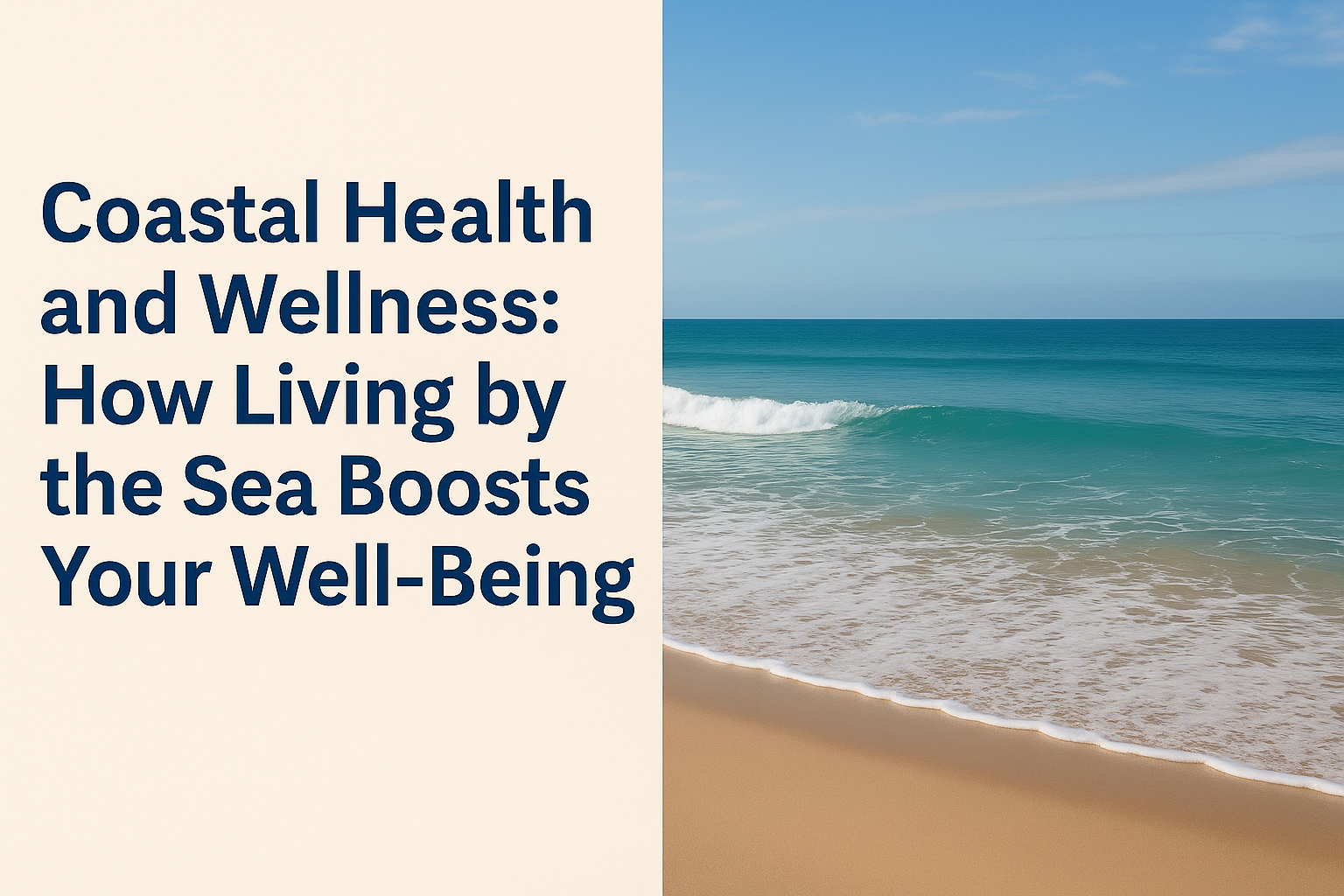Coastal Health and Wellness: How Living by the Sea Boosts Your Well-Being

Coastal health and wellness is about living in harmony with the sea. It’s not just about being near water. It’s about how that environment affects your body, mind, and spirit. The ocean has a calming effect on people. The sound of waves, the feel of sand underfoot, and even the smell of salt air can reduce stress and improve mood.
People who live by the coast often move more. They walk along beaches, swim in the ocean, or kayak through calm waters. These activities are good for the heart, muscles, and joints. Eating fresh seafood, fruits, and vegetables from coastal farms also plays a big role. These foods support long-term health and energy levels.
Why Coastal Health and Wellness Matters
Living near the coast helps you stay active. Walking on soft sand burns more calories than walking on pavement. Swimming in cool water strengthens muscles without strain. Being near water lowers stress. Studies show that people who live near the ocean report better mental health than those who don’t.
Salt air is full of negative ions. These help balance brain chemicals like serotonin. That means better sleep, mood, and focus. Coastal life encourages routines that match natural rhythms. Waking up with the sunrise. Going to bed when it gets dark. This improves sleep quality and overall well-being.
Mental Wellness and the Ocean
Water makes people feel calm. Watching waves roll in slows down the mind. It lowers heart rate and eases anxiety. People who meditate by the sea say they feel more present. The sound of water blocks out distractions. It becomes easier to think clearly.
Many coastal towns have mindfulness groups. Some meet at sunrise for yoga on the beach. Others practice deep breathing while walking barefoot in the sand. Even if you don’t live by the coast, you can still benefit. Listening to ocean sounds, using sea salt diffusers, or adding blue tones to your space can bring peace indoors.
Read More » Coles Jobs: What You Need to Know Before Applying
Physical Activity in Coastal Areas
Beaches are natural gyms. Sand creates resistance. Walking or jogging there builds leg strength and endurance. Swimming is low-impact but high-reward. It works every muscle group. Cold water boosts circulation and metabolism. Kayaking and paddleboarding build core strength. They also improve balance and coordination. These sports are fun and easy to learn.
Hiking near cliffs or dunes adds elevation training. Uphill paths build stamina. Downhill trails test control and agility. Most coastal areas offer community fitness events. Sunrise yoga classes, open-water swims, and beach boot camps keep people motivated and connected.

Eating Like a Local: Coastal Diets
Seafood is a staple in coastal diets. Fish like salmon, sardines, and mackerel are rich in omega-3s. These fats support brain and heart health. Seaweed and kelp are common in many coastal cultures. They provide iodine, iron, and fiber. These nutrients help regulate hormones and digestion.
Fresh produce grows well near the coast. Farmers grow tomatoes, greens, citrus, and root vegetables in nearby fields. These foods are packed with vitamins and antioxidants. Whole grains and legumes round out meals. Brown rice, lentils, and beans provide lasting energy and gut-friendly fiber. You don’t need to live by the coast to eat this way. Buy fresh fish weekly. Add seaweed snacks to your diet. Choose seasonal fruits and veggies over processed foods.
Spiritual Connection to the Sea
The ocean feels sacred to many. Watching tides rise and fall brings perspective. It reminds people that change is natural and necessary. Some write gratitude lists by the water. Others light candles or pray during sunset. These small rituals build emotional resilience. Walking along the shore at dawn clears the mind. It starts the day with a purpose. Many find clarity after spending quiet time near the sea.
Tide pools and marine life inspire awe. Seeing crabs, birds, and sea plants thrive in harsh conditions teaches adaptability. This connection isn’t just spiritual. It’s practical. People who spend time near water often feel more grounded and peaceful in daily life.
Bringing Coastal Wellness Into Daily Life (Even If You Don’t Live by the Sea)
You don’t need an ocean view to enjoy coastal wellness. Start with small changes. Add blues and whites to your home. Use driftwood or seashells as decor. Walk barefoot on grass or sand once a week. This “earthing” practice connects you to the earth’s energy. It reduces inflammation and improves sleep. Visit lakes, rivers, or fountains regularly. Being near any water source helps relax the mind and body.
Try salt therapy if you have allergies or skin issues. Salt rooms mimic coastal caves. They help clear sinuses and soothe skin. Use ocean sound playlists for meditation or sleep. Calm music with wave sounds can lower stress and improve focus. Eat like someone who lives by the coast. Include seafood, seaweed, citrus, and whole grains in your meals.
Conclusion: A Lifestyle Worth Living
Coastal health and wellness is a way of life. It blends movement, nutrition, and nature into daily habits. The result is better physical health, clearer thinking, and deeper peace. The ocean supports all of this. But you don’t have to live by the sea to benefit. Small, consistent choices bring the same results.
Whether you add sea air to your home, walk barefoot outdoors, or eat more fish, each step counts. These habits build long-term health and happiness. So take a deep breath. Let go of stress. Find ways to bring the calm of the coast into your everyday life.
Read More » Top Cash Back Business Credit Cards: How to Earn While You Spend
Frequently Asked Questions (FAQ)
Q1: What is coastal health and wellness?
A: It’s a lifestyle that uses the benefits of coastal environments—like clean air, natural movement, and healthy food—to improve physical, mental, and emotional health.
Q2: Can I follow coastal wellness if I live inland?
A: Yes. You can use ocean sounds, visit lakes, add seafood to your diet, and walk barefoot on grass to get similar benefits.
Q3: Does being near water really improve mental health?
A: Yes. Studies show that people near water report less stress and better mood. The ocean’s rhythm calms the brain and lowers cortisol.
Q4: What physical activities are common in coastal wellness?
A: Popular ones include swimming, kayaking, beach yoga, hiking, and walking on sand. These boost fitness and connect you with nature.
Q5: Are there scientific studies supporting coastal health?
A: Yes. Research shows that blue spaces like oceans and lakes reduce stress, improve focus, and support healthier lifestyles.
Q6: How do I start a coastal wellness routine?
A: Start small. Add ocean sounds, eat more seafood, walk barefoot, and visit water sources often. These steps bring the benefits of coastal life into any home.



